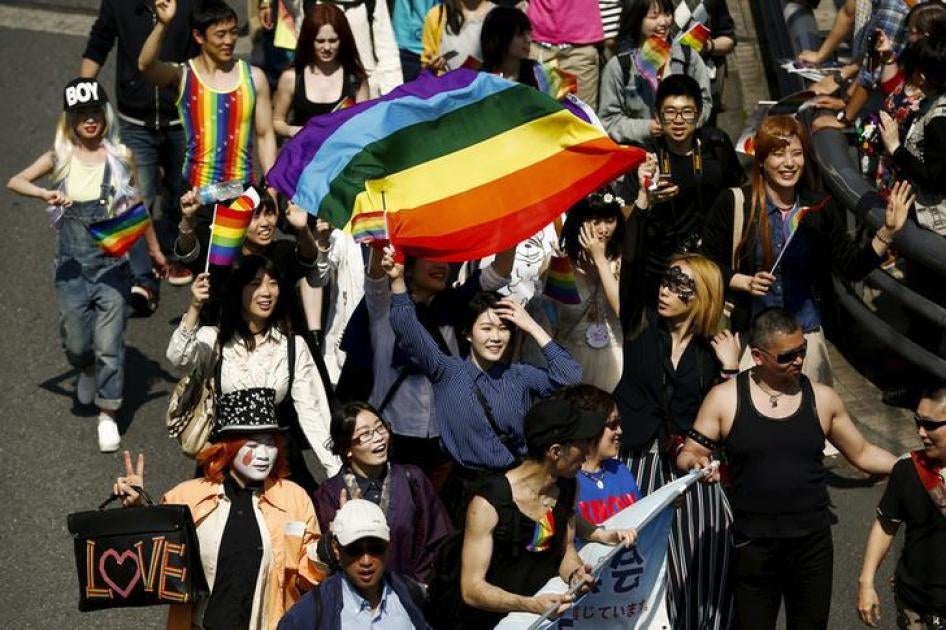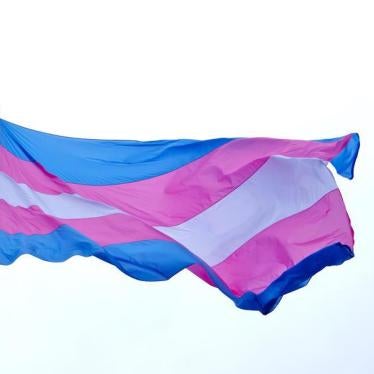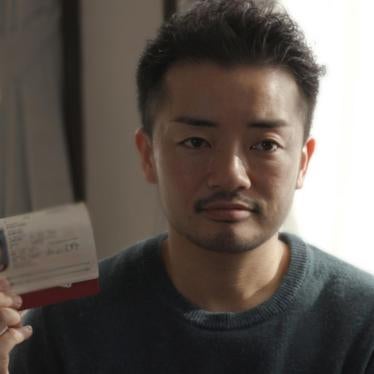(Tokyo) – Japan’s Prime Minister Shinzo Abe should commit to introducing a law protecting against discrimination on the basis of sexual orientation and gender identity, J-ALL, Athlete Ally, and Human Rights Watch said today. Ninety-six human rights and lesbian, gay, bisexual, and transgender (LGBT) organizations signed and sent a letter to the prime minister on April 17, 2020 after several months of coordination with related officials, but he has not responded.
Tokyo was slated to host the 2020 Summer Olympics, but the International Olympic Committee and the Japanese government postponed the games for a year due to the Covid-19 pandemic. To mark the International Day against Homophobia, Biphobia, and Transphobia (IDAHOBIT) on May 17, the 96 groups publicly urged the government to pass LGBT non-discrimination protections ahead of the Olympics in 2021.
“LGBT people in Japan are entitled to equal protection under the law,” said Yuri Igarashi, co-representative director of the Japan Alliance for LGBT Legislation (J-ALL), an umbrella organization of 100 LGBT organizations in Japan. “Postponing the Olympic Games to 2021 will give the government time to introduce and pass protections of benefit to everyone in Japan.”
The Olympic Charter expressly bans “discrimination of any kind” including on the grounds of sexual orientation as a “Fundamental Principle of Olympism.” Japan has also ratified core international human rights treaties that obligate the government to protect against discrimination, including the International Covenants on Civil and Political Rights and on Economic, Social and Cultural Rights.
The Tokyo 2020 Summer Games were advertised as celebrating “unity in diversity” and “passing on a legacy for the future.” In March 2015 Prime Minister Abe publicly proclaimed Japan’s intention to “stamp out discrimination and respect human rights” and made clear at the national Diet that “discrimination or prejudice against sexual minorities is not allowed in any aspect of society.”
“We have seen through history the power of the Olympics to mobilize athletes and fans to speak out for what they believe in, from Tommie Smith and John Carlos protesting racism in 1968 to the Principle 6 campaign in 2014,” said Hudson Taylor, founder and executive director of Athlete Ally. “Sport teaches us that we are stronger when we stand together, and now is the time for the global sport community to stand in solidarity with the LGBT community in Japan.”
While Japan’s national government has not enacted anti-discrimination legislation on the grounds of sexual orientation and gender identity, in October 2018 the Tokyo metropolitan government adopted an ordinance that protects LGBT people from discrimination in line with the Olympic Charter.
Tokyo’s action was important, but several Tokyo Olympic competitions, including the marathon, golf, fencing, race walking, and surfing, will take place outside of Tokyo in Hokkaido, Saitama, Chiba, Shizuoka, Kanagawa, Miyagi, and Fukushima prefectures. LGBT fans, athletes, and visitors in these prefectures will not be protected under Tokyo’s anti-discrimination ordinance.
Japan has increasingly taken a leadership role at the United Nations by voting for both the 2011 and 2014 Human Rights Council resolutions calling for an end to violence and discrimination based on sexual orientation and gender identity. But LGBT people in Japan continue to face intense social pressure and fewer legal protections than other Japanese. According to the results of a survey J-ALL conducted in April, LGBT people in Japan are facing specific difficulties during the Covid-19 pandemic, including disruption of access to health care, decreased income, and fear that their sexual orientation and gender identity will be exposed without legal protections when they seek services.
IDAHOBIT is celebrated annually on May 17 around the world including International organizations as the day against discrimination to mark the day in 1990 when the World Health Organization removed its diagnosis for homosexuality as a “mental disorder.”
“Japan has an opportunity to be a global LGBT rights leader,” said Kanae Doi, Japan director at Human Rights Watch. “The Tokyo metropolitan government has shown solidarity with the LGBT community, and the national government should follow suit.”
On this memorial day, J-ALL, Human Rights Watch, and Athlete Ally strongly call for the elimination of discrimination on the basis of sexual orientation or gender identity under any circumstances.







